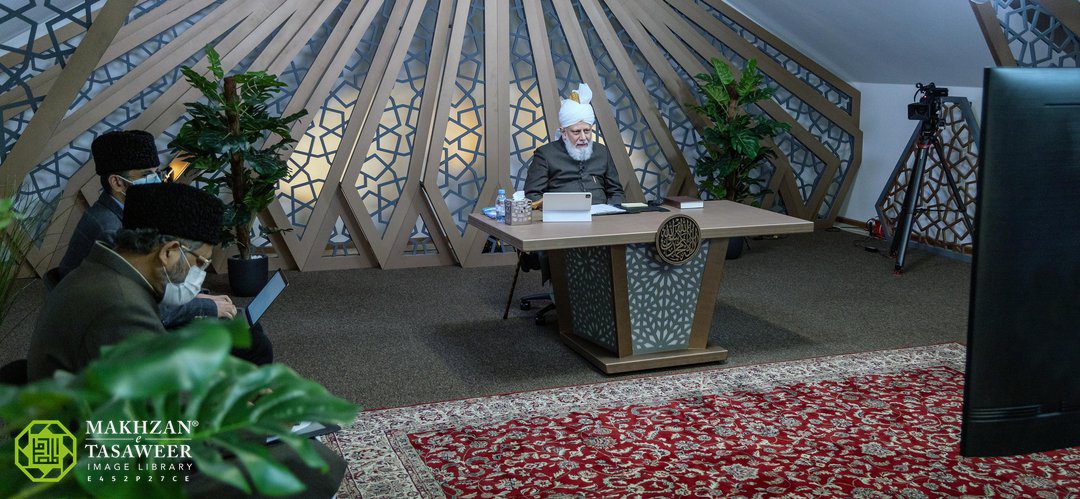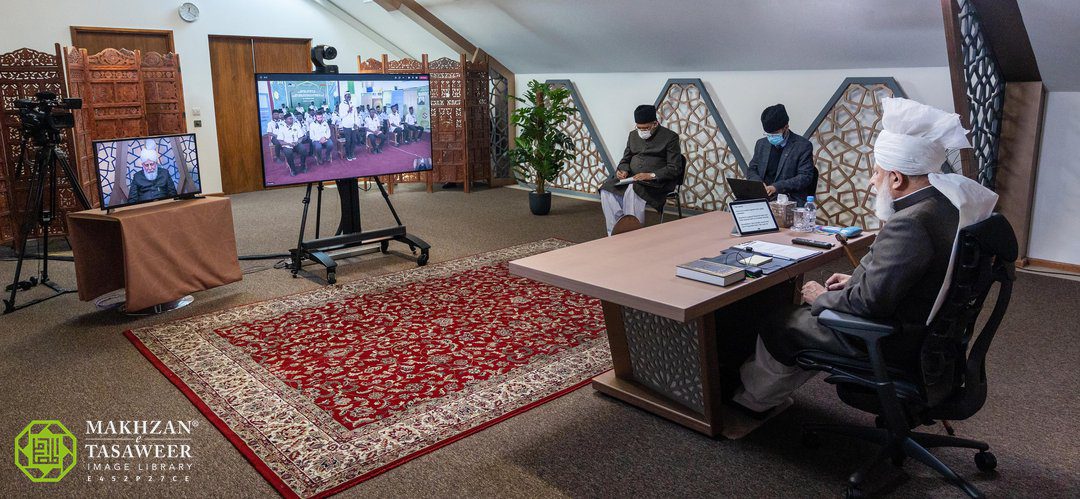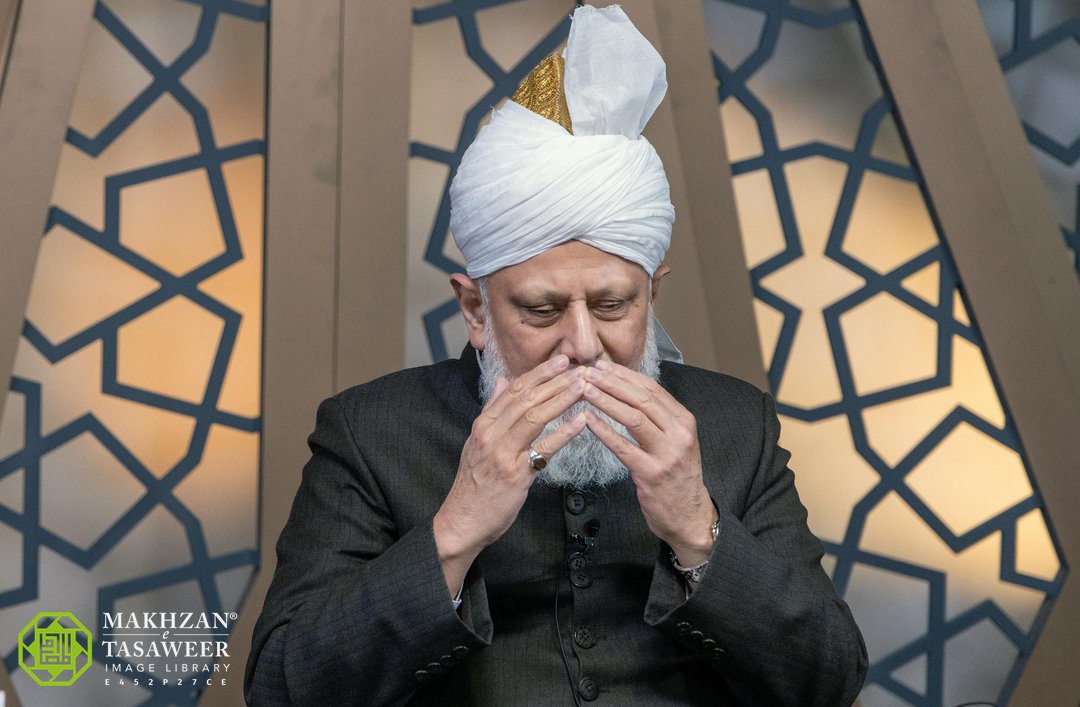Majlis Khuddamul Ahmadiyya Burkina Faso Have Honour of Virtual Meeting with World Head of Ahmadiyya Muslim Community

“The most important element is that the Khuddam should be in the habit of observing the five daily prayers” – Hazrat Mirza Masroor Ahmad
On 26 February 2022, the World Head of the Ahmadiyya Muslim Community, the Fifth Khalifa (Caliph), His Holiness Hazrat Mirza Masroor Ahmad held a virtual online meeting with the National Amila (Executive) of Majlis Khuddamul Ahmadiyya Burkina Faso (Ahmadiyya Muslim Youth Auxiliary), as well as regional Qaideen.
His Holiness presided the meeting from MTA Studios in Islamabad, Tilford, whilst more than 30 Amila members joined the meeting virtually from the Jamia-tul-Mubashireen premises situated in Butsan-e-Mahdi, located near Ouagadougou in Burkina Faso.
During the 65-minute meeting, all present had the opportunity to speak to His Holiness and the National Amila members were able to present a report about their respective departments and to receive the guidance and instructions of His Holiness on a range of issues.

Speaking to the Mohtamim Tarbiyyat, responsible for the moral and spiritual training of the youth, His Holiness reminded of the various aspects his department should focus on for the Khuddam’s Tarbiyyat.
Asking him about his plan, Hazrat Mirza Masroor Ahmad highlighted a number of topics and said:
“Are the Khuddam focused on observing the five daily prayers? Are they attentive towards recitation of the Holy Quran and bettering their morals? And if they do pay attention towards these aspects then to what degree? …The most important element is that the Khuddam should be in the habit of observing the five daily prayers. If Khuddam become focused and attentive towards their prayers, then their attention will also become drawn towards other pious deeds.”
Hazrat Mirza Masroor Ahmad further stated:
“The Khuddam should be encouraged to pay greater attention to the study of the Holy Quran. So draw further attention towards this. Other than that, you should regularly circulate and share the sayings of the Holy Prophet Muhammad (peace and blessings be upon him) and share a page or half a page from the writings of the Promised Messiah (peace be upon him) with the Khuddam… Also, Khuddam should be encouraged to regularly listen to my Friday Sermon on MTA.”
His Holiness also encouraged the Mohtamim Tabligh, responsible for outreach work, to involve the Amila members from the national, regional and local levels to carry out Tabligh and that they should be set targets in order to motivate them.
Speaking to the Mohtamim Ishaat, responsible for publications, His Holiness said that they should encourage Khuddam to write articles for their Magazine.
Hazrat Mirza Masroor Ahmad said:
“Encourage those who are educated and living in the cities that they should also try to write some articles. Some of them can write an article on how did they accept the Ahmadiyya Muslim Community, how did their parents accept the Ahmadiyya Muslim Community, what is Islam Ahmadiyyat, why should we believe in Islam Ahmadiyyat, and what are the prophecies of the Holy Prophet (peace and blessings be upon him) with regards to the coming of the Promised Messiah (peace be upon him). So, like this, they will increase their knowledge and their faith. And at least then you will also encourage them to write more for the Ahmadiyya Muslim Community and after seeing their articles, some more Khuddam members will also become active in writing articles, or at least they will try to increase themselves in their faith.”
The Mohtamim Tarbiyyat Nau Mubayi’een, responsible for the moral and spiritual training of new converts to the Ahmadiyya Muslim Community mentioned that people from all kinds of religious backgrounds were entering the fold of the Ahmadiyya Muslim Community.
Upon this, His Holiness emphasised the importance of taking care of the different needs of the new converts.

Hazrat Mirza Masroor Ahmad said:
“For people (Ahmadi Muslim converts) of different religious backgrounds, there should be different plans or programmes. So those who are Muslim, it is quite possible that they already know the words of prayers [such as the words of] Surah Al-Fatiha and they can read the Holy Quran. For them, you have to make a plan that [teaches them about] what is Ahmadiyyat. Tell them more about the Ahmadiyya Muslim Community and try to increase their Islamic religious knowledge; history of Islam; history of Ahmadiyyat etc. And those who come from Christian background, they should have a different training programme. They should learn the words of Surah Al-Fatiha, the prayers, Salat. Tell them how to offer Salat and what is the meaning of Salat or why should we offer five daily prayers and [there should be a separate plan] for other groups as well. So different groups should have different plans or programmes.”
Hazrat Mirza Masroor Ahmad further stated:
“Those who know Surah Al-Fatiha, they should know the meaning of it. When they know the meaning of it, while praying they can pray more fervently than before. So, in this way, each and every word we recite in our prayer, you should know the meaning of it and that will strengthen your faith and firm belief in God.”
As the meeting concluded, Hazrat Mirza Masroor Ahmad prayed for Majlis Khuddamul Ahmadiyya Burkina Faso and said:
“May Allah the Almighty keep you safe and let you work hard for the cause of the Ahmadiyya Muslim Community and give you the strength to spread the message of Islam Ahmadiyyat all across the country.”